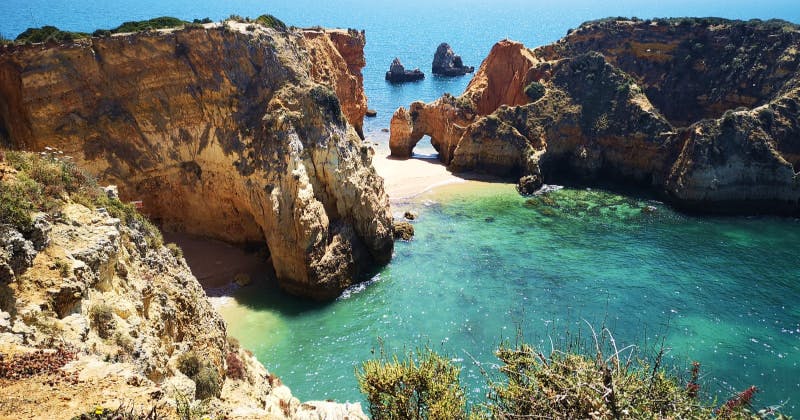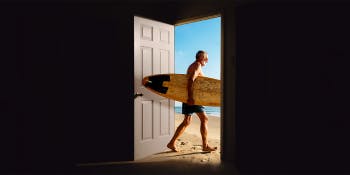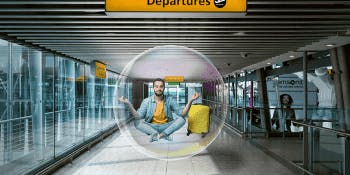
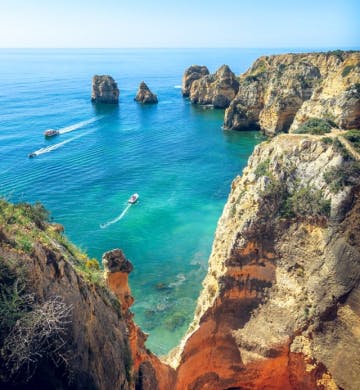
Algarve Travel Guide
The Algarve is one of the most popular holiday destinations in Portugal – find out why and prepare for your next trip there with our Algarve travel guide!
The Algarve is Portugal’s most southern region, characterised by its long, golden beaches, high, rugged cliffs and popular resorts. It encompasses the entire southernmost chunk of the country, framed on two sides by the Atlantic.
What you will find in this guide:
Practical Info
GMT +1
Euro EUR
Portuguese
Type F (C & E also fit)
Avg 2 hrs 50 mins
Some facts about the Algarve
The Algarve is one of the most popular destinations in Portugal for beach holidays, golfing getaways and even birdwatching. Its history spans from Roman times to the Moorish occupation and beyond, giving it a fascinating mix of historic cities and castles.
With 125 miles of coastline washed by the Atlantic, it’s pretty obvious why the region has such stunning beaches.
Algarve Weather
With an all year round warm climate accompanied by an average of 3000 hours of sunshine a year, the Algarve is the perfect place to escape for a bit of sunshine.
The Algarve is drier and more arid than the rest of Portugal, and tends to be warmer too. The temperature doesn’t vary too much throughout the year, with daily averages somewhere between 19C and 31C.
One of the best times to visit is summer – there’s less rain and the temperature is slightly warmer. Most of the 500mm of rain that falls in the Algarve each year falls between October and March.
Speaking the language
Portuguese is the main language in the Algarve, though English is widely spoken along with Spanish, German and French. If you want to try the language while you’re there, here are some handy phrases to start you off:
Helpful Portuguese phrases
- Hello (informal) - Ola
- How are you? - Como estas?
- What 's your name? - Qual o seu nome?
- My name is - Meu nome é
- Please - Por favor
- Thank you - Obrigado
- How much is it? - Quanto isso custa?
- Where is? - Onde é?
- Table for two - Mesa para dois
- One - Um
- Two - Dois
- Three - Três
- Four - Quatro
- Five - Cinco
- The bill, please - A conta por favor
- Goodbye - Tchau
Numbers:
Getting to the Algarve
The main airport in the Algarve is in Faro, which is the capital of the region. There are plenty of direct flights available throughout the year, and it takes around 2 and a half hours from the UK.
Getting from Faro Airport to your accommodation
The easiest way to get where you need to go is to book a transfer before you go. From Faro it’s around 30-40 minutes to reach popular resorts like Vilamoura and Albufeira. If you’re staying a bit further away, you’re looking at a little over an hour to reach Lagos or Sagres.
Have a look at our transfers to see if they suit your trip.
Getting around the Algarve
By car
It’s relatively simple to travel the Algarve by road if you decide to hire a car.
There are two main roads that you'll probably end up using if driving in the Algarve. The A22 motorway runs east to west across the region, although there is a toll for using this road. Most hire cars have a high-tech transponder built in and any tolls will be added to your final bill.
The other main road is the N125. It takes a bit longer to get around using this road, but the scenery tends to be better along this route.
By bus
There are a few bus companies in the Algarve and between them they keep all the main locations in the region well connected. It’s a good idea to keep some cash handy for the fares.
If you’re looking to get the bus from Faro airport into the main city you’ll need the number 16. It takes around 20 minutes and costs just over €2 for a single journey.
For exploring the wider region the best thing to do is get yourself a tourist pass – they cost around €30 for three days, or €40 for a week. You can pick these up at any main bus station – you can buy regular bus tickets here too if you don’t need a pass.
By train
A railway line links the east of Algarve to the west, connecting Lagos with Vila Real de Santo Antonio and all the towns in between. These include Albufeira, Portimao and Faro, so it’s a good way to get around.
You can book your tickets in advance online or on the official Comboios de Portugal app. Plus, if you’re planning trips in advance you can save up to 65% depending on how early you book.
Or you can opt for a tourist travel card which gives you unlimited journeys over two or three days – it’s around €20-30 depending on how long you need.
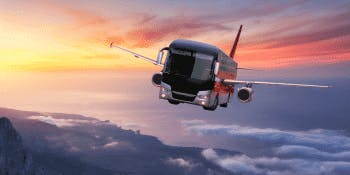
Algarve Airport Transfers
Pre-book your transfers from Faro Airport with FREE cancellations up to three days before departure.

Algarve Car Hire
Compare and book holiday car hire, with prices starting from £8.04 per day with FREE cancellations*
Things to do in the Algarve
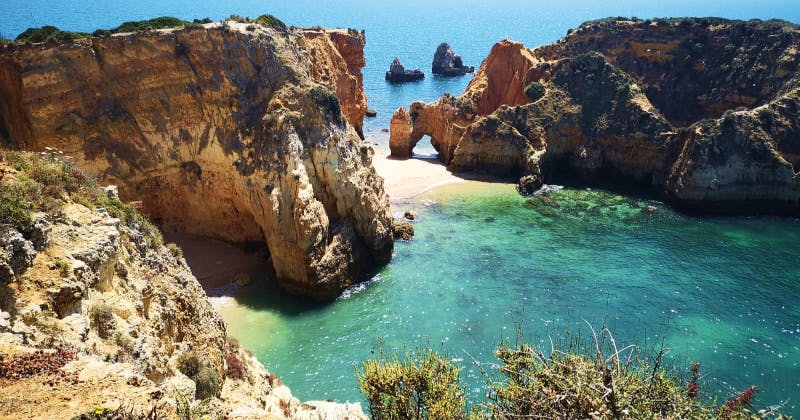
Ponta da Piedade
This striking area along the coast of Lagos is one of the Algarve’s most famous attractions. A rugged headland characterised by the Algarve’s signature golden limestone, it’s the place to go for jaw-dropping views of the lofty rock formations and cliffs.
Follow the paths and steps that snake around and up and down the landscape and scout out the picturesque coves and the lighthouse that overlooks the area. You can also explore by sea, on a boat tour, or by a paddleboard or kayak.
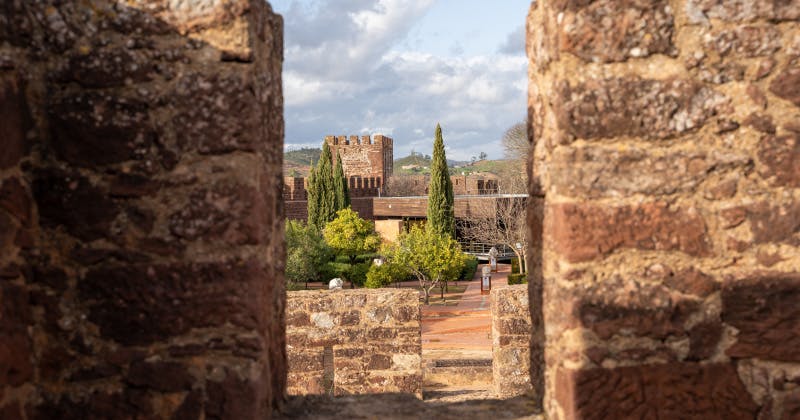
Castelo de Silves
Guarding the small, traditional town of Silves, this incredible castle has a colourful history. Though Roman in origin, it wears its Arabic influences most proudly, encircling a set of Moorish ruins.
There’s an old grain silo there along with an old cistern in a stunning brick vault. The best way to explore the castle is to follow the old patrol route along the walls, passing the turrets and towers and taking in views of the town below.
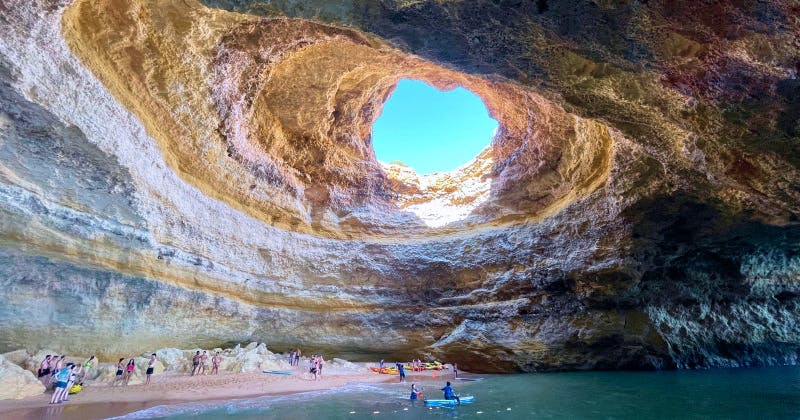
Benagil Cave
Benagil Cave, or Algar de Benagil, is a coastal cave carved into a golden limestone cliff face. You can reach it from the sea and it’s a popular spot thanks to its sandy, beach-like interior that’s illuminated by a hole in the ceiling of the cave that lets in the sunshine – it’s affectionately known as the eye.
You can swim to the cave from Benagil Beach, but it is quite a way, so you might be better off taking a kayak or paddleboard, or one of the regular boats that ferries visitors to and from the cave.
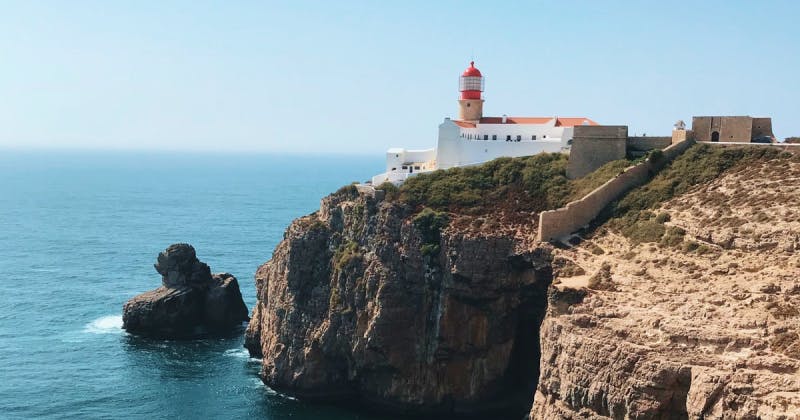
Sagres
Ideal for escaping the crowds and exploring the rugged side of the Algarve. Plus if you're a fan of surfing then you'll like it here as the swell rolls in off the Atlantic. If you're after a more relaxed time there are four amazing beaches within distance of the town - Praia do Tonel, Praia da Baleeira, Praia do Martinhal and Praia de Mareta.
The main attraction is Fortaleza de Sagres - there's a cliffside walk, lighthouse and the slightly mysterious Rosa dos Ventos. Cabo de São Vicente is just outside the town - the natural most westerly point of mainland Europe and was once the end of the known world!
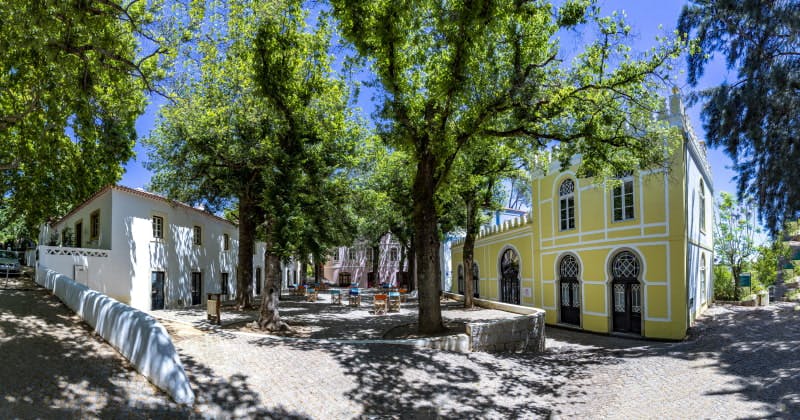
Monchique
Though the Algarve is known for its beaches and resorts, if that's not really your scene then head inland to Monchique. It’s a small market town in the forest - though there isn't much to do that's really the charm of it. Explore the streets and visit the ruined Nossa Senhora do Desterro which was destroyed in an earthquake in 1755.
Make sure you also head to Caldas de Monchique for some relaxation. This thermal spa is just outside the town and the water is famous for its healing properties.
Best places to stay in the Algarve
Lagos
Ideal for a beach break
Lagos has a bit of everything, starting with some of the best beaches in the country – so if you’re looking to fly and flop at a beach resort this might be the place for you. With a choice of sheltered coves and shallow waters this is an ideal place to bring the whole family.
But if you’re after a wider range of activities, there’s horse riding, mountain biking and even whale and shark watching trips on offer.
Praia de Rocha
For a lively nightlife
A bit built up but not without its charm, Praia de Rocha is a lively and modern beach resort that really comes alive at night. With dozens of restaurants, pubs, karaoke bars and clubs for if you just want a few beers by the beach, or if you want to go out out.
Of course, there are endless beaches for relaxing in the sun, some with a choice of watersports, including jet skiing and windsurfing.
Almancil
History and gorgeous landscapes
Almancil isn’t your typical beach resort, in fact it’s pretty far from it – but that’s all part of its charm. It’s a pretty little market town with a clutch of boutiques and bistros, and easy access to some less touristy attractions away from the beaches.
The Ria Formosa Nature Reserve is nearby and it’s a great spot for long walks and birdwatching. It’s also next door to the Vale de Lobo golf course if that’s more your bag.
What to eat in the Algarve
The Algarve has a rich culinary history that’s produced many Portuguese classics, including some incomparable seafood.
Many meals begin with couvert, which is a mix of olives, carrots and garlic marinated in white wine and olive oil.
Conquilas al Algarvia are a real treat for seafood lovers – it’s fresh clams cooked with Portuguese sausage and served with coriander. There’s also cataplana de marisco, which is a hearty stew of lobster, clams, prawns, squid and anything else that has been freshly caught that day.
Best beaches in the Algarve
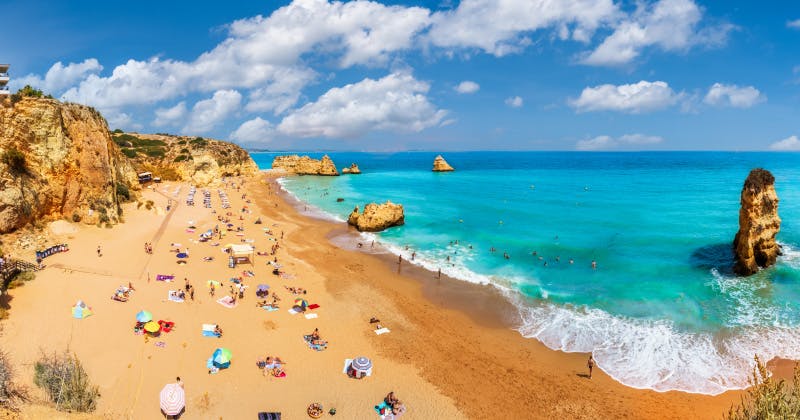
Praia de Dona Ana
Praia de Dona Ana is the typical Algarve beach – sandy, backed by high golden cliffs, and lapped by calm blue water. It’s about 20 minutes from the centre of Lagos on foot and is popular year round thanks to its soft sand, clear water and the facilities which make it perfect for a day out.
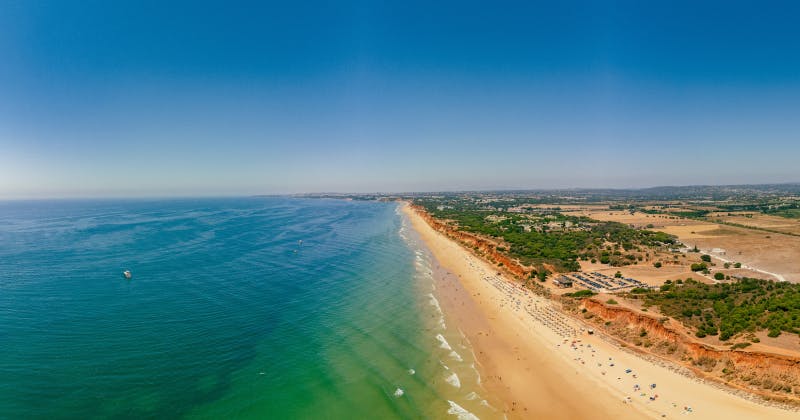
Praia da Falesia
Stretching 6 kilometres east from Vilamoura, Praia da Falesia is one of the longest in the country – so you’re pretty much guaranteed a spot no matter how busy it gets. It really does seem to go on forever, and that’s no bad thing. Walk for hours in the soft sand and let the surf wash over your toes – absolute bliss!
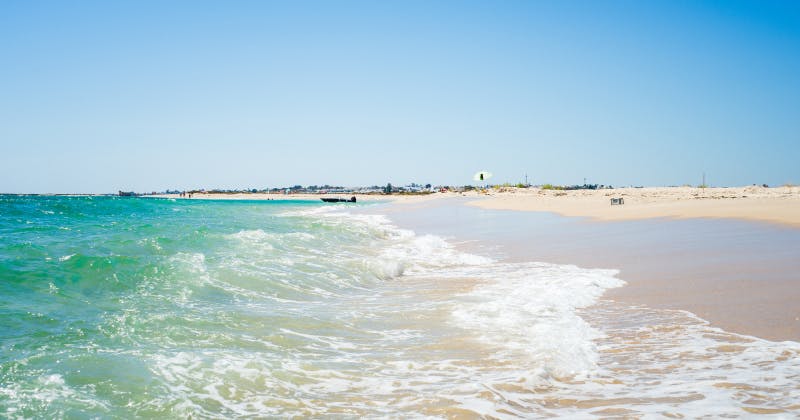
Praia da Fuseta
This beach is actually on a small island which you can only reach by ferry – but it’s so worth it. The sand is white and pristine and the sea is like liquid crystal, making it ideal for snorkelling. It’s never too busy and you can always find a secluded spot to roll out your towel and relax in peace.
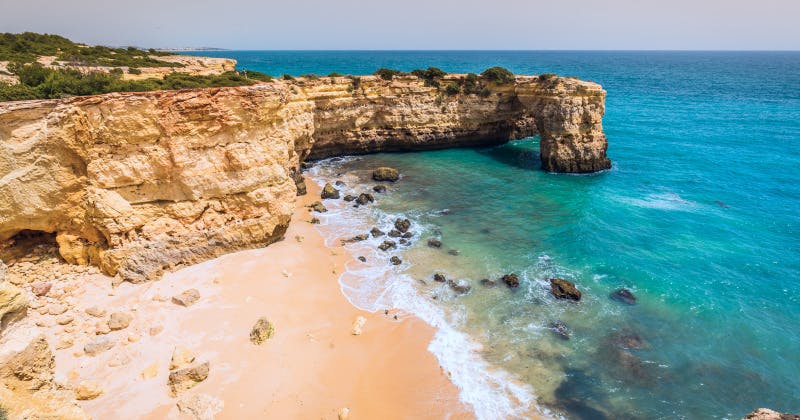
Praia de Albandeira
This beach is famous for the dramatic limestone arch that straddles the surf – a bit like a Portuguese version of Dorset’s Durdle Door. The beach is relatively small, so you might have to fight for a spot (get there early in the day!), but it’s totally worth visiting just for the scenery. The water is pretty much transparent too so it’s perfect for swimming.
Algarve for families
The Algarve is a very popular destination for families thanks to its enticing combo of endless sandy beaches, modern resorts and diverse range of attractions. Many of the beaches have ramp access too, making them pushchair friendly.
There really is something for every member of the family here, whether you’re exploring caves, sailing in search of dolphins, splashing it up in a water park or swinging through the trees at Parque Aventura.
Accessibility in the Algarve
There are plenty of initiatives and assistance available that make the Algarve an accessible destination for everyone who wants to visit. This starts as soon as you land in Faro Airport, which provides the ‘MyWay’ service – offering personalised assistance from qualified professionals.
Adapted transfer vehicles are available to get you to your resort and the region also boasts 46 accessible beaches – you can spot them by the white flag and logo. Most of them have access ramps, accessible toilets, hand rails and even amphibious wheelchairs. Check out the full list of beaches.
Algarve for LGBTQ+ travellers
Portugal scores an A on the LGBTQ+ Travel Safety Index
Portugal is largely safe and accepting of the LGBTQ+ community, and is actually the fifth safest country in the world for LGBTQ+ travellers (according to the Travel Safety Index).
That said, there isn’t a particularly big scene in the Algarve compared to what you might find in Lisbon or the Spanish costas. There’s a handful of gay bars in Albufeira and Portimao if you’re looking for a fun night out.
Sustainable tourism in the Algarve
The Algarve, and Portugal as a whole, is actively working on becoming a more responsible destination – giving eco-conscious travellers more options. These include the eco-resort Ombria, more of a focus on local boutique hotels and extra development on nature and nautical tourism, improving local habitats for wildlife.
Algarve FAQs
What is the Algarve known for?As one of Portugal’s more popular holiday destinations, the Algarve is known for its incredible golden beaches, lively resorts and all-around gorgeous scenery.
What is the nicest part of the Algarve?
From the dramatic headland of Sagres, to the countless golden beaches and traditional towns, there are plenty of gorgeous spots to explore and find in the Algarve.
Is it safe to visit the Algarve?
The Algarve is relatively safe, with low crime rates and secure accommodation. Just take all the sensible precautions you normally would while travelling and you’ll probably be fine.
What language is spoken in the Algarve?
Portuguese is the official language but English is widely spoken.





